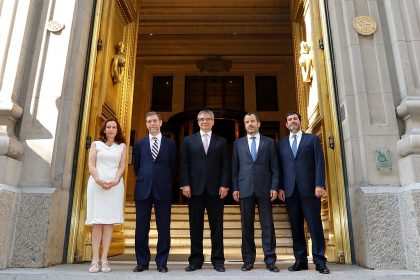The governor of the central bank of Chile noted that the CBDC would have to co-exist with cash rather than replace it.
Governor Rosanna Costa of the Central Bank of Chile said the central bank digital currency (CBDC) would need to consider offline payments. The Central Bank Governor said the CBDC would need to accept offline payments while speaking at an event on the 10th of May. The CBDC race is intense among global central banks. While some are at initial stages, others have gone far in the development and are already in testing phases. Some central banks like the People’s Bank of China have already distributed their digital currency to specific citizens for testing.
According to a recent BIS survey, 9 of 10 central banks are considering creating and issuing their own digital assets. This comes amid the growing adoption go Bitcoin and its acceptance as a legal currency. However, the BIS Survey revealed that many of these financial institutions are struggling with design issues in order to ensure accessibility and privacy.
Speaking at the event hosted by the Swiss national bank, the governor of the central bank of Chile said CBDC “should operate both online and offline.” However, he added that the required technology for such operation was not necessarily efficient today.” In his opinion, the system should allow authorities to trace the transactions afterward. The governor added that the system should also enable the authorities to safeguard personal data.
Central Bank of Chile: CBDC Needs to Work Offline and Co-Exist With Cash
Furthermore, the governor of the central bank of Chile noted that the CBDC would have to co-exist with cash rather than replace it. The bank’s executive also said that the CBDC would exist along with commercial banks and be convertible. Costa also promised security in regards to the digital currency. Like some other CBDCs, the central bank of Chile could begin the pilot projects on its CBDC soon. The pilot projects are bound to happen after appropriate discussions with the public and private sectors later in the year.
The EU officials, for example, are looking at private means of payment for small purchases. Meanwhile, some other jurisdictions believe theta central banks should consider areas where payments are complex. The managing director of the Monetary Authority of Singapore said at the event:
“We are barking up the wrong tree with retail CBDCs. The tree we should be barking up is wholesale CBDCs for cross border payments.”
Recently, the International Monetary Fund (IMF) said governments should review their laws to place restrictions on cross-border payments. The financial stability watchdog showed its worries about Russia evading sanctions.
The director of the IMF’s Monetary and Capital Markets Department, Tobias Adrian, noted:
“In many countries with weak institutions, citizens might have incentives to move money out of the country. The vast majority of countries have some forms of capital controls, and there’s both direct and anecdotal evidence that crypto assets are used for that.”
Read other crypto-related news on Coinspeaker.
next